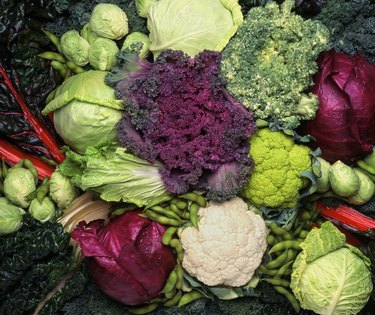
Prebiotics. Probiotics. Synbiotics. If gut health has your head spinning, we don't blame you. Let's start with prebiotics. If you're looking to boost your gut microbiome — the trillions of bacteria that live in your GI tract — fiber-rich prebiotics are pretty important to understand.
Here, registered dietitians explain what prebiotics are, why they're critical for gut health and how you can put more of them on your plate.
What Exactly Are Prebiotics?
"Prebiotics are a type of carbohydrate found mostly in fiber-rich fruits and vegetables that provide a good source of resistant starches, which are not digestible by the body," says Rebecca Ditkoff, RDN, a New York City-based registered dietitian who specializes in digestive health. "Instead, they pass through the gut and serve as food for the probiotics and help them to thrive."
How are they different from probiotics? Probiotics are the bacteria and/or yeast that naturally exist in your GI tract and are also present in certain fermented foods such as yogurt, kimchi and sauerkraut. Probiotics are microorganisms that can occur in foods; they aren't foods themselves. Prebiotics, on the other hand, are actual foods.
One more distinction to keep in mind: "It's important to note that while all prebiotics are fiber, not all fiber is prebiotic," Ditkoff says.
Looking to Get More Prebiotic Foods?
Add these to your plate:
- Chicory root
- Jerusalem artichokes (aka sunchokes)
- Cruciferous vegetables such as cauliflower, cabbage and broccoli
- Alliums like garlic, onion, leeks and shallots
- Asparagus
- Beets
- Fennel
- Chickpeas
- Lentils
- Oats
- Barley
- Pistachios
- Almonds with skins
- Green or unripe bananas
- Apples
Examples of specific prebiotics include inulin found in garlic and onions, resistant starch found in unripe bananas, pectin found in apples and fructooligosaccharides (FOS) found in asparagus.
Prebiotic carbs can also be isolated and added to foods. Inulin, for example, is increasingly added to processed foods like protein bars and yogurts. As well as boosting the fiber content of the food, it also improves the taste and mouthfeel. Inulin can have a sweet taste and creamy texture, which means manufacturers can decrease the sugar and fat content of their products if they add inulin to the mix. The fiber-rich ingredient can also help make foods more filling, potentially contributing to weight loss.
Why Are Prebiotics So Important?
"Prebiotics are fuel for the good bacteria in the gut," explains Kristy Del Coro, RDN, a Maine-based registered dietitian and co-founder of the Culinary Nutrition Conference. "They stimulate the body's own production of probiotics."
That's crucial, since those good bacteria, probiotics, have been shown to support immune function, help manage eczema, drive down inflammation and regulate our digestion and absorption of medications, per the Cleveland Clinic.
"Prebiotics promote the formation of molecules called short-chain fatty acids (SCFAs) in the body," Del Coro adds. "SCFAs play a big role in the health of the gut and body by helping modulate the immune system, and may even directly affect genes and cell proliferation."
In particular, SCFAs may deactivate certain genes that are involved in DNA replication and cell proliferation of colon cancer cells, per a September 2019 study in the journal Anticancer Research.
SCFAs also provide energy to the intestinal cells, support muscle function and may even decrease the risk of bowel disorders, per Harvard's T.H. Chan School of Public Health.
Plus, prebiotic foods are nutritious by definition, since they're plant foods that offer up fiber along with other key vitamins and minerals. Oats, for example, deliver magnesium, thiamine and zinc, per the USDA, while bananas are a good source of potassium, according to the USDA.
Related Reading
Are There Any Downsides to Prebiotics?
"Some prebiotics, particularly inulin, may cause GI issues in those who are sensitive to FODMAPs," Ditkoff says. FODMAPs are a group of fermentable carbohydrates that can spark digestive issues in some susceptible people. Since prebiotic foods are high in fermentable fiber, they may not be a good fit for anyone following a low-FODMAP diet.
"For those who are just starting to incorporate these foods into their diets, they can cause short-term GI symptoms like gas and bloating," Del Coro says. "Start [eating them] in small doses and gradually increase the amount over time. Also, be sure to increase your fluid intake to minimize any discomfort." Loading up on fiber without adequate hydration can up your risk of constipation.
Should You Be Taking a Prebiotic Supplement?
Not necessarily, since it's pretty doable to get prebiotics from whole foods, Ditkoff says.
As with all supplements, prebiotic pills don't undergo the same testing and approval process by the FDA as medications do. Manufacturers are responsible for making sure they're safe before they're marketed and that label claims are true, but there's no guarantee they'll be effective. If you're dealing with GI issues, talk to a health professional about your options instead of buying a supplement at random.
"I recommend consulting with your primary care provider or a registered dietitian familiar with prebiotics and probiotics to discuss your options," Ditkoff says.
Is this an emergency? If you are experiencing serious medical symptoms, please see the National Library of Medicine’s list of signs you need emergency medical attention or call 911.